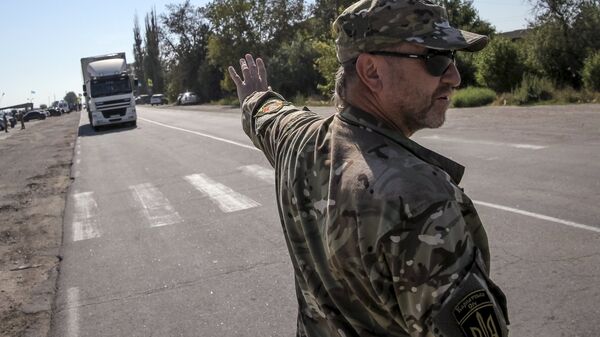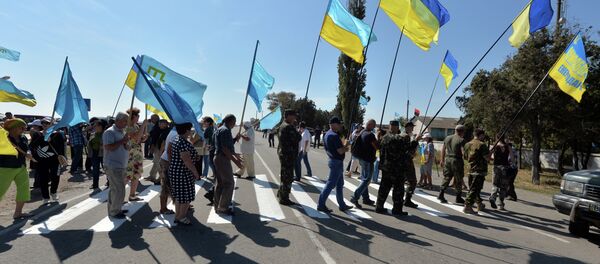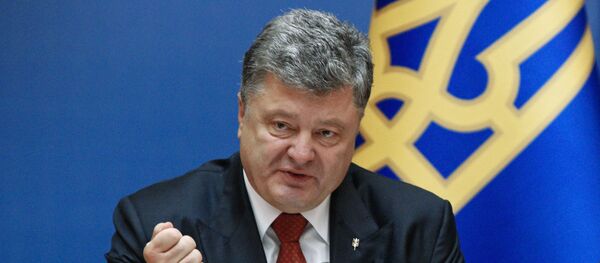The blockade was announced last week by Verkhovna Rada MPs Refat Chubarov and Mustafa Dzhemilev, officials who had earlier been banned from entering Crimea for five years after being accused of inciting ethnic hatred. Calculating that nearly 8,000 trucks have carried a total of $475 million worth of food goods to Crimea since the beginning of the year, the politicians noted that Ukrainian businessmen are "trading in the blood" of the peninsula's Tatar community, who, they say, is facing systemic discrimination.
Unveiled at 12 pm on Sunday by a group of about 100 Tatar activists, joined by Ukraine's ultranationalist Right Sector paramilitary group, the blockade has successfully blocked off border checkpoints at Chongar and Kalanchak, the two main entry points into Crimea from the Ukrainian side.
#Chongar, checkpoint between #Ukraine and #Crimea is blocked by Crimean Tatars pic.twitter.com/QBYGO8g6vw
— Kateryna_Kruk (@Kateryna_Kruk) 20 сентября 2015
Эти 150-180 фур не пропустят. Приняли решение #блокадакрыма pic.twitter.com/A2PhnZBJbb
— Kristina Berdynskykh (@berdynskykh_k) 20 сентября 2015
"These 150-180 trucks won't be let through. The decision has been made."
Каланчак. Тоже более 100 фур стоят. #блокадакрыма pic.twitter.com/8FMv4XAnlN
— Kristina Berdynskykh (@berdynskykh_k) 20 сентября 2015
"Kalanchak. Also over 100 trucks standing still."
Каланчак. Водители пришли к Чубарову на переговоры #блокадакрыма pic.twitter.com/5c5HzC7Z4n
— Kristina Berdynskykh (@berdynskykh_k) 20 сентября 2015
"Kalanchak. Drivers came to carry out negotiations with Chubarov."
The initiative apparently has the complete support of local security forces, with over 100 police officers assigned to "maintain order" during the operation, with reports that they have provided activists with food and water, toilets, and tents. Ukrainian Internal Affairs Ministry Advisor Zoryan Shkiryak emphasized that the blockade's coordinators had agreed their activities with the Interior Ministry, the Security Service and the Border Service.
#Kherson police will paint a zebra crossing at the road t #Crimea, so no-one can say Crimean Tatars blocking trucks violate Ukrainian law.
— Evgen Vorobiov (@vorobyov) 20 сентября 2015
Shortly before the blockade stepped into force, Internal Affairs Communications Director Artem Shevchenko published photos on his Facebook account of Ukrainian law enforcement agents on the border with Crimea, in full battle gear with guns and armored vehicles occupying trenches and engineering fortifications. The photos were accompanied by the message that police would "ensure order" and "allow no provocations," presumably from the Russian side.
Батальйон ПСМОП "Херсон" та особовий склад ГУМВС на Херсонщині забезпечуватимуть громадський порядок під час акції блоку…
Posted by Артем Шевченко on Sunday, September 20, 2015
Meanwhile, Right Sector, a coalition of ultranationalist and openly neo-Nazi organizations playing a major role in last year's Maidan coup and the violence that followed, announced that they are setting up spike strips and heavy concrete blocks on the roads to block off any unwanted movement.
Чонгар. Дорога в Крым #блокадаКрыма Фото — INSIDER pic.twitter.com/zSZLx5dFBt
— INSIDER (@theinsider_ua) 20 сентября 2015
"Chongar: the road toward Crimea."
Long-haul truckers, drivers of smaller vehicles, and pedestrians at the border regions have told local media that they have spotted armed people at the border.
Representatives of the Tatar community inside Crimea began criticizing the initiative even before the blockade stepped into force, with social organizations saying that the blockade was a "cynical move" which would only serve to inflate the egos of Mejlis's leaders.
Remzi Ilyasov, the head of Crimean Tatar social organization Kyrym, responded to Chubarov and Dzhemilev's initiative by telling Russia's RIA Novosti that having spoken "to many people from the Crimean Tatar community, from intellectuals to farmers and ordinary workers, never once did I hear that Crimean Tatars wanted someone to blockade Crimea."
On Sunday morning, with the blockade imminent, a group of Tatar activists in Bakhchysarai, central Crimea organized a picket outside a house belonging to Dzhemilev, featuring a banner reading "Disgrace of an Overseas Lackey," and the words "Traitor" "Outcast" and "Judas" spray painted on the fence outside the home.
«Изгой. Предатель», — на доме Джемилева в Бахчисарае появились граффити с обвинениями pic.twitter.com/xLe4g2LdxU
— ollga k. (@k_ollga) 20 сентября 2015
"'Outcast', 'Traitor' — graffiti charges have appeared on Dzhemilev's house in Bakhchisarai."
A small group of Tatar activists in the Crimean capital of Simferopol gathered to voice their opposition to the blockade, protesting in front of buildings belonging Lenur Islyamov, one of the blockade's key supporters, who has businesses in Crimea but lives in Kiev.
Crimean Tatar activists speaking to local and federal Russian media say that Tatars living close to the border on the Ukrainian side are also opposed to the blockade, activist Seytumer Nimetullaev telling RIA Novosti that taxi drivers and those selling their produce to the peninsula will be heavily affected.
"In Novoalekseevka [a town located in Kherson a few kilometers from the Crimean border], 80 percent of the Crimean Tatars are against the blockade," Nimetullaev noted, adding that "those who express such an opinion out loud face persecution by the Ukrainian Security Service and local police." The activist warned that the blockade is being strengthened by Right Sector militants from western and central Ukraine.
First Vice-Premier Mikhail Sheremet echoed the premier's comments, noting that the blockade is a "political farce" demonstrating its organizers true attitudes toward the people of Crimea.
Crimean Vice Premier Ruslan Balbek emphasized that the organizers' calculation that Crimea could not survive without Ukrainian products was mistaken. "Their calculations are wrong. Over the last year, Crimea's food market has almost completely reoriented itself toward supply from mainland Russia. Therefore a blockade on food products is akin to tilting at windmills."
Balbek suspects that the blockade is really an attempt by the Majlis's leaders to achieve control over the border to "cash in" by creating "a monopoly on the supply of food products to Crimea."
Commenting on the affair, Russian Duma member Franz Klintsevich suggested that the idea that the blockade could be organized by Majlis and the Right Sector was "nonsense," adding that authorities in Kiev are just "shy" about openly declaring their position on the issue.
"In any normal country, it's not even possible to imagine that some people with no legal authority could block the state border on their own, preventing the completely lawful activity of others," Klintsevich noted. "It's obvious that the blockade is taking place with tacit approval from Kiev, which at the same time is 'shy' to declare its official position on the issue. The Ukrainian government has once again allowed itself to be led by the most extremist forces, and nothing good can come of this."



